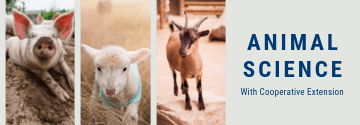Information from UF/IFAS News
GAINESVILLE, Fla. — One of the world’s fastest growing agricultural industries, goat farming, is plagued by deadly intestinal parasites, particularly the barber’s pole worm – a pest that poses great danger to the goat-farming industry in the Southeastern U.S. and other parts of the world.
Improper use of commercial medicines has helped make the parasites resistant to many deworming drugs.
But recent research by the University of Florida’s Animal Sciences department may be closing in on a solution. Although researchers say it needs more study, they’ve recently found papaya seeds to be an inexpensive, alternative method for ridding goats of their parasitic passengers.
Led by Adegbola Adesogan, a professor of ruminant nutrition, the study examined the effect of natural food supplements on reducing intestinal worms in goats. Papaya seeds were found to be the most effective treatment, significantly reducing parasite egg and adult counts.
“The beauty of using papaya seeds is they’re out there and we aren’t really doing much with them,” Adesogan said. “To find just grinding the seeds and feeding a small quantity daily purges the parasites is, I think, very encouraging.”
The study, part of a master’s thesis by Miguel Zarate under Adesogan’s supervision, compared supplementary lespedeza hay, peanut hay, mucuna seed and papaya seeds in varied proportions for their deworming properties. Just 10 grams of ground papaya seed added to a base diet of bahiagrass removed 78 percent of adult parasites and 72 percent of their eggs. The next most effective treatment, a half-and-half mixture of lespedeza and bahiagrass, reduced the adult worm count by 52 percent.
The use of papaya seeds or their derivatives may also be useful someday for treating parasites in cattle and other species, but more experiments must be done to look at issues like residues, tissues and other possible side effects before it is recommended for widespread use, Adesogan said.
“I would say that this is very promising,” he said, “but we’re still in early days and we need to do more work to develop it and to answer these questions of side effects and withdrawal times and safety.”
Adesogan said high concentrations of certain enzymes, alkaloids and cyanates were the likely candidates for the papaya seeds’ success but the specific active ingredient is yet to be confirmed. The amount of protein supplied by the papaya seeds was low in relation to the other supplements and probably had limited effect.
While UF/IFAS scientists aren’t ready yet to endorse papaya seed-supplemented diets for goats, the study indicated that at least two weeks would be needed to effectively reduce parasite populations in infected individuals.
The papaya has a wide growth habitat in tropical countries and some subtropical areas like south Florida. In his native Nigeria, Adesogan said, as in many tropical developing nations, papaya trees are everywhere in the wild and in residential areas.
“You don’t have to rely on expensive equipment to process the seeds, because with just a small traditional grinding stone, farmers could grind the small quantity for their animals,” Adesogan said. “This would be a locally available, homegrown kind of remedy to solve this big problem.”

